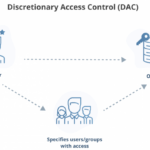Discretionary Access Control (DAC) is a security model where the owner of a resource determines who has access and what operations they can perform. It is widely used due to its flexibility but can pose risks if permissions are mismanaged or users share credentials. To strengthen DAC, organizations often pair it with additional access controls such as proximity-based authentication or centralized audit systems.
A data breach is a security incident in which information is accessed by an unauthorized party. Data breaches can be caused by phishing, social engineering, insider threats, and careless employees. Many potential data breaches can be prevented by deploying two-factor authentication solutions and using a password manager to enforce strong passwords.
Data encryption in cybersecurity is a conversion of data from readable form into encoded format. This data is useable only when it is decoded with a unique decryption key which is usually generated before or during the encryption. Data encryption is a building block of data security and there is hardly a network system that does not use this technique.
Data protection refers to a set of strategies and processes for protecting sensitive data from compromise, corruption, or loss. The data protection strategy assures that the organization’s data is also available for future use and in the worst case of data loss, the system should restore it to the functional state.
Defense-in-Depth is a cybersecurity strategy that uses multiple layers of defense to protect systems and data from cyber threats. Each layer acts as a safeguard in case another fails, combining tools like firewalls, encryption, user authentication, and physical security. This layered approach helps organizations strengthen resilience against complex, evolving attacks.
The Defense Federal Acquisition Regulation Supplement (DFARS) is a supplement to the Federal Acquisition Regulation (FAR) system that provides acquisition compliance requirements for the Department of Defense (DoD) procurement process.
A dictionary attack is a type of cyber attack targeting weak passwords in an attempt to gain unauthorized access to an account or system. "Dictionary" refers to a collection of common words, phrases, or combinations of characters that the attacker uses in an attempt to guess these passwords.
GateKeeper Proximity enhances Data Loss Prevention (DLP) by securing endpoint access with proximity-based authentication and automatic locking, helping organizations protect sensitive data, prevent unauthorized exposure, and meet compliance requirements without disrupting workflows.
Dumpster diving is a physical security threat where attackers search through discarded materials to recover sensitive information. Common targets include printed passwords, access credentials, internal memos, or hardware that may still store data. This method can lead to serious data breaches, especially in organizations that lack secure disposal practices.
According to studies, over 30% of all support tickets are related to password resets/forgotten passwords.
Enterprise 2FA and password manager. One key for all your passwords. Experience fully automated login and security. For example, faster MFA, auto-OTP, password manager, and worry-free workflow with proximity-based privileged access management for Windows 11, 10, 8, 7, VPNs, websites, and desktop applications including MES, EHR, CAD, and more. Overall, a massive upgrade to security and efficiency.
or call 240-547-5446










